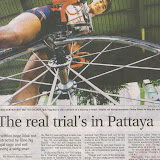Saturday, June 27, 2009
By George Schroeder
Register-Guard columnist
Appeared in print: Saturday, Jun 27, 2009
Sports: Track & Field: Story
An hour before the gun, Alberto Salazar popped the pill. Tiny and peach-colored, the low-dose beta blocker was preventive medicine, just something to keep his heart quiet.
It did its work. As the race unfolded, Salazar stood calmly along the rail on the curve at Hayward Field, near the videoboard. He called out times and occasional advice to Kara Goucher, and you’d have thought she was on a routine training run.
She won.
And if you’re keeping score, that’s three races, three wins for Salazar’s runners at the USA Track & Field Championships.
As expected, Galen Rupp won the men’s 10,000 meters on Thursday. In a surprise, Amy Yoder Begley won the women’s 10K the same night. Friday, Goucher easily won the women’s 5,000.
We’re not counting Dathan Ritzenhein, who finished second to Rupp, then hurried to Portland to join Salazar’s group. But the message is clear.
It’s past time we declared Salazar’s philosophy a big success: Give a good coach a few elite distance runners. Provide them every imaginable resource. And watch out.
“It absolutely proves it,” Goucher said. “He had three athletes run in this meet and he got three firsts. Pretty good.”
Yeah, pretty good. And after a little prodding, Salazar admitted to some satisfaction.
“Is there a part of me that says, ‘Yeah, I told you so?’” he said. “Yeah. Absolutely.”
Salazar insists he’s not motivated by the naysayers. And he has mellowed over the years, especially since suffering a heart attack two years ago.
At 50, he’s only a dozen pounds heavier than when he ran. Despite the heart trouble and two stents, he still runs six days a week, maybe four miles at an eight-minute pace.
It all feels so good, with or without the Inderal in tiny doses.
But sure, there’s validation.
When the Oregon Project got started, people worried that Salazar would overtrain the runners, like he famously did to himself. They wondered especially about the future of Rupp, a prodigy tied so closely to a guy who’d almost run himself to death — once, quite literally — by his early 20s.
But Salazar has handled Rupp very carefully (which, predictably, led to carping about coddling; you can’t win over the critics). Even at 22, Rupp’s weekly workload is significantly less than many of his peers, and Salazar has mandated regular breaks from training.
The results, beginning last year with Rupp’s trip to Beijing, and rocketing upward since, are clear. People are seriously comparing the kid to Steve Prefontaine, which is too much for now.
But do you still doubt that Rupp has the potential to eventually run with the Kenyans and Ethiopians?
Also, we’ve all heard the whispers — sometimes, it’s been more like hissing — about the cutting-edge experiments Salazar conducts on his runners: the high-altitude oxygen tents-turned-house, the underwater and anti-gravity treadmills, and so on. If it seemed like a good idea, Salazar was willing to spend Nike’s money to try it.
Even Salazar laughs about some of the ideas, like the vibrating platform he installed in his house. When runners stood on it, the jostling was supposed to elicit some sort of muscular response.
It shook the entire house. Paintings fell off the walls. Nails popped out.
Salazar gave the platforms to the U.S. Olympic training center. Now Oregon’s athletic department has several, and you can buy them at Costco — so there’s apparently some beneficial effect.
“In the end, I just didn’t know what I was doing,” he said, laughing at the memory.
But if there was a shred of scientific research and some testimonials, Salazar was willing to try. And it’s pretty clear now that he mostly knew what he was doing.
“Everybody he coaches,” Goucher said, “has made these huge leaps and bounds.”
It’s happening beyond Salazar’s immediate group. Did you see the men’s 5,000 meters on Friday?
A 1-2-3 sweep by Oregon Track Club Elite, whose runners train alongside Rupp and Goucher and the rest.
They came from Wisconsin with Jerry Schumacher, their coach. But the group has embraced Salazar’s philosophy, and what they did Friday night didn’t hurt the cause.
The ultimate goal is to make Americans “truly competitive on the world stage,” and that still feels a long way off.
But we’re witnessing a rebirth of American distance running. Its epicenter is Portland.
Its beating heart is Salazar’s.
Labels: news









0 comments:
Post a Comment